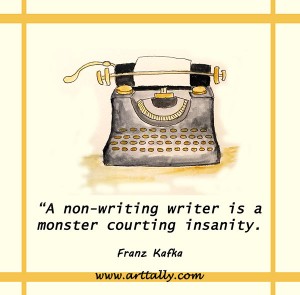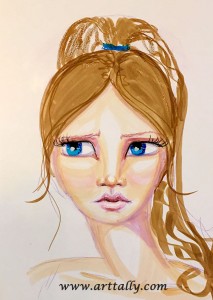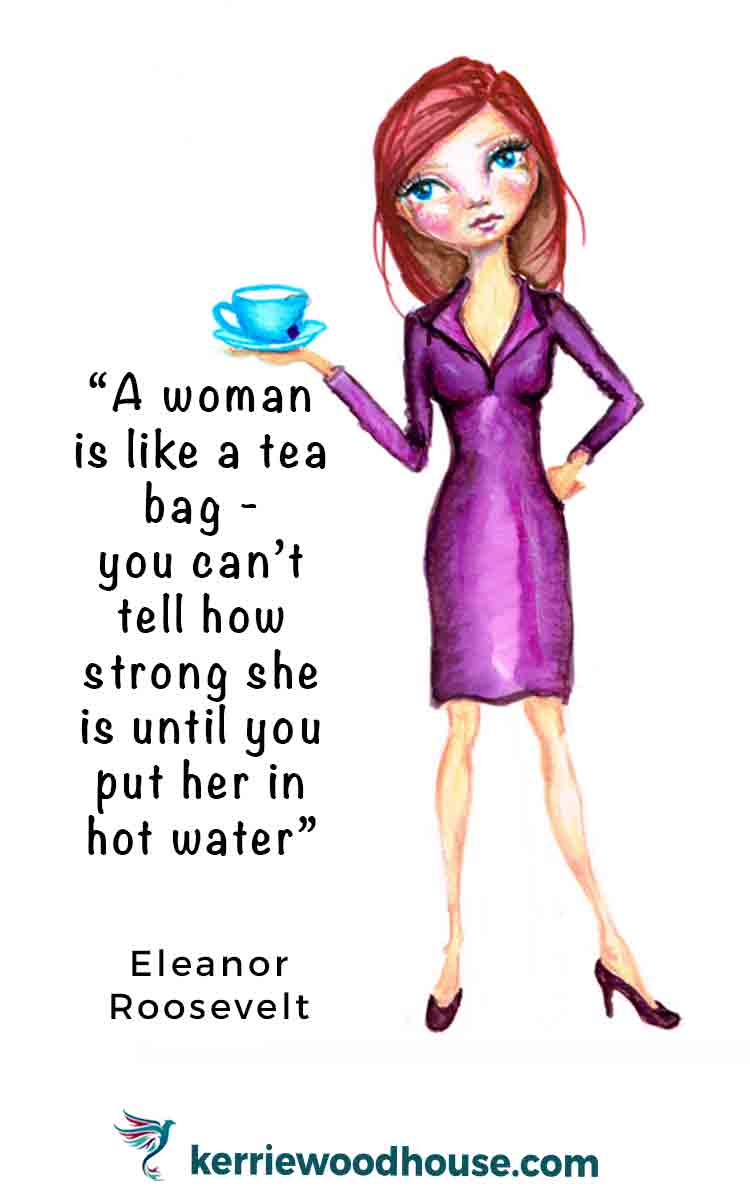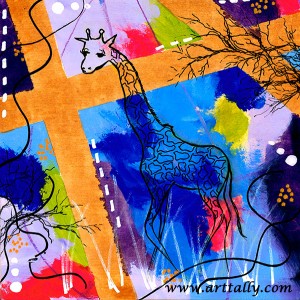Where do you get your ideas?
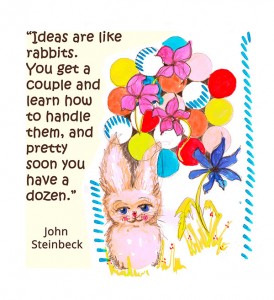 One of the questions people often ask authors is, 'where do you get your ideas?'
One of the questions people often ask authors is, 'where do you get your ideas?'
This was something that used to trouble me. A lot. I worried that I didn't have any ideas. Then before I knew it my problem was not a lack of ideas, but in fact, too many ideas. So many ideas that it is hard to know which idea to focus on and hard to discern a good idea from a bad one. In many ways it feels very much like the same problem.
I think it is because ideas come from the wild and free part of us that the rational, critical self fears so much. As children we spend much more time in that wild free place where ideas abound, all ideas are good and nearly everything seems like fun. We have to learn to tap in to that child like part of ourselves again to find those ideas. When we do they multiply like John Steinbeck promises.
"Ideas are like rabbits. You get a couple and learn how to handle them, and pretty soon you have a dozen." John Steinbeck
Armed with too many ideas, the only way forward is to remain in that same child like state of creative abundance. Free of judgement, open to exploration, and holding off that rational, critical self for long enough to let the best ideas develop enough to reveal themselves.
The importance of books for children
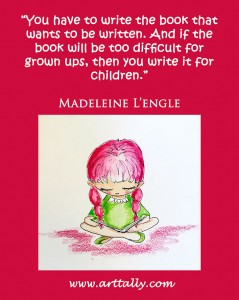 I have always had a deep seated reverence for children's literature. The books that have made the biggest impact on me have always been books for children. I think writing for children is harder than writing for adults. Perhaps that is the way it should be. Really good children's stories convey complex ideas and themes. You know you have fully understood a big important idea when you can explain it simply to a child. If you can do that with humour, with a sense of playfulness and joy, then you are a children's writer.
I have always had a deep seated reverence for children's literature. The books that have made the biggest impact on me have always been books for children. I think writing for children is harder than writing for adults. Perhaps that is the way it should be. Really good children's stories convey complex ideas and themes. You know you have fully understood a big important idea when you can explain it simply to a child. If you can do that with humour, with a sense of playfulness and joy, then you are a children's writer.
"You have to write the book that wants to be written. And if that book will be too difficult for grown ups, then you write it for children." Madeleine L'Engle
Intuitive painting, intuitive writing - lessons in surrendering
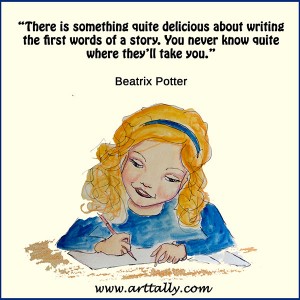 There is something utterly delightful about the idea that you don't have to know exactly where you are going when you start a creative project. The important thing is just to start and trust in the creative process to get you where you need to be. I suppose it is a lesson in surrendering.
There is something utterly delightful about the idea that you don't have to know exactly where you are going when you start a creative project. The important thing is just to start and trust in the creative process to get you where you need to be. I suppose it is a lesson in surrendering.
I'm not sure I realised that you could simply begin a story and let it lead where it may. I did learn that you can paint this way - any one who has had a go at intuitive painting will know exactly what I am talking about.
If you haven't you might want to check out two of my favourite teachers of intuitive painting, Alena Hennessy and Flora Bowley. Even if you don't fancy painting yourself it is a fascinating thing to watch Flora Bowley's paintings emerge - you can see her in action here. And she explains her whole process in her book Brave Intuitive Painting. Love it.
When the going gets tough
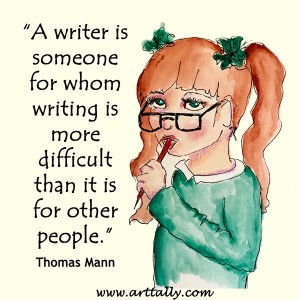 We are into the second half of the NaNoWriMo Challenge already. Hard to believe there are less days remaining than we have already done. Especially when your word count has not yet made it to the half way mark! Uh oh... hope I can do it.
We are into the second half of the NaNoWriMo Challenge already. Hard to believe there are less days remaining than we have already done. Especially when your word count has not yet made it to the half way mark! Uh oh... hope I can do it.
In the meantime I console myself with this thought...
"A writer is someone for whom writing is more difficult than it is for other people." Thomas Mann
If you think you might be a writer heed this warning
If you suspect that you might be a writer, then there is one thing you must do.
WRITE.
Grab a notepad, a laptop or the back of that shopping list stuffed down the bottom of your handbag. Unless she is given a voice that frustrated writer trapped inside you will drive you (and everyone around you) crazy.
Figure out what is stopping you and find a way past it.
Heed this warning from Frank Kafka:
"A non-writing writer is a monster courting insanity."
The best way to learn to write is to write
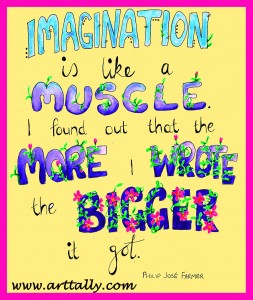 I have come to the conclusion that writing, like a lot of things, is something you really have to learn by doing. In the beginning it is frustrating. Progress is slow. Probably occasionally mortifying. Okay... often mortifying.
I have come to the conclusion that writing, like a lot of things, is something you really have to learn by doing. In the beginning it is frustrating. Progress is slow. Probably occasionally mortifying. Okay... often mortifying.
Lots of books have been written about writing and I suspect most new writers have read many of them. But when you start writing it doesn't feel like any of that preparation helped much. But if you persist a marvelous thing happens. All those abstract concepts you read about, like point of view, story arc, and the rule of 'show don't tell', suddenly make a whole lot more sense. I'm not sure you can really get to grips with any of it until you are actually trying to apply it. The best way to learn to write is to write.
One of the great things about NaNoWriMo is that you don't have time to get stuck. I know very well that if I had been writing this without the clock ticking down and that graph of my word count progress constantly accusing me I would have got myself stuck trying to solve one of these technical problems. But during NaNoWriMo you just have to make the best of it, perhaps make a note to come back to it later and move on. In doing that you put in the practice hours that are the only way to get better at writing. Sure you will have to come back to all those sticking points at a later date, but it is better to press on in the meantime than to simply draw to a grinding halt.
I am surprised by how often things end up resolving themselves. Perhaps it is those hamsters on that wheel inside my head that manage to nut it all out while I am drawing, sleeping or doing those endless loads of washing a family is capable of conjuring up daily. Either way, it seems if you leave those mole hills alone for a time, they get to remain mole hills instead of turning into the mountains that might completely block your path. Who knew?
Even one of the things that worried me the most - that I didn't have the imagination to come up with an entire story for a novel seems to be getting easier. Now that for me is an enormous relief. I am happy to report that I (so far) concur with Philip Jose Farmer who says,
"Imagination is a muscle. I found out that the more I used it, the bigger it got."
A series of illustrated quotes on writing
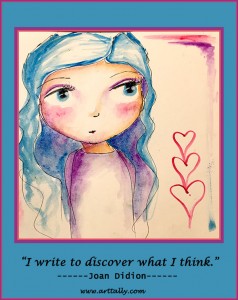 Did I mention my series for the month? I expect that in all my excitement to get writing a novel (!) I might have neglected that. I know you may have probably already figured it out, but this month I am doing a series of illustrated quotes on writing. Its a good series for me because I love quotations and it is giving me a chance to use Photoshop a bit more.
Did I mention my series for the month? I expect that in all my excitement to get writing a novel (!) I might have neglected that. I know you may have probably already figured it out, but this month I am doing a series of illustrated quotes on writing. Its a good series for me because I love quotations and it is giving me a chance to use Photoshop a bit more.
Have you tried Photoshop? I find it as frustrating as it is amazing. It does so many awesome things but I often find trying to do the simplest task can be infuriatingly difficult. My first in this series I did with Canva in the end. If Photoshop is frustrating you, or you don't have access to it, I highly recommend giving Canva a go. Quite simple and lots of fun.
After the first in this series On Writing, I have been trying to be strict with myself about using Photoshop. Like everything, it is easier every day. Here is the link to the whole series on one page.
How to write a novel
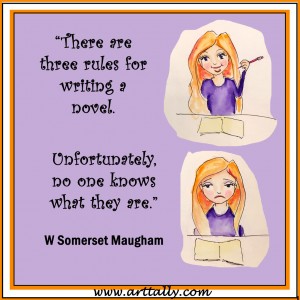 It is amazing how many resources you can find on how to write a novel. Writers are a generous community. Unfortunately, no two writers are alike. As Diana Gabaldon pointed out in her pep talk, we all work a little differently. This means that only you can figure out what works for you. On the plus side - if the goal is to do it your way, you can't possibly get it wrong.
It is amazing how many resources you can find on how to write a novel. Writers are a generous community. Unfortunately, no two writers are alike. As Diana Gabaldon pointed out in her pep talk, we all work a little differently. This means that only you can figure out what works for you. On the plus side - if the goal is to do it your way, you can't possibly get it wrong.
How comforting to know that blundering along however you can is just what you are supposed to be doing.
"There are three rules for writing a novel. Unfortunately, no one knows what they are." W Somerset Maugham.
Are you hunting down some inspiration?
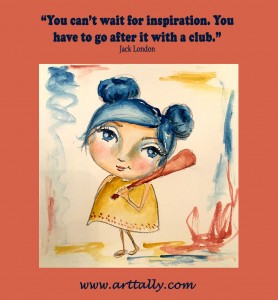 I would love to be showering you with a whole lot of motivating words, but right now I am off hunting down some inspiration for the next 1667 words of my novel. Never fear though....if you are also in search of writing inspiration I do have some useful tips to share.
I would love to be showering you with a whole lot of motivating words, but right now I am off hunting down some inspiration for the next 1667 words of my novel. Never fear though....if you are also in search of writing inspiration I do have some useful tips to share.
However, if you are joining in the NaNoWriMo challenge then you don't have time for all that! My advice is to follow the butt-in-seat-hands-on-keyboard approach. Only 21 days to go!
Reasons for writing - what is your writing why?
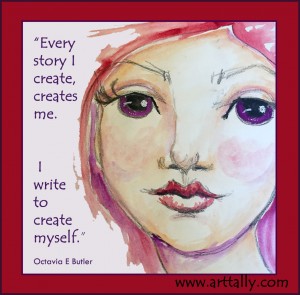 One of the things that has always fascinated me is the question of what makes a writer write. Something everyone seems to agree on is that writing is good for you. But no one seems to have explained their reasons for writing 'why' more intriguingly than Octavia E Butler:
One of the things that has always fascinated me is the question of what makes a writer write. Something everyone seems to agree on is that writing is good for you. But no one seems to have explained their reasons for writing 'why' more intriguingly than Octavia E Butler:
"Every story I create, creates me. I write to create myself."
Is a pretty face like a passport?
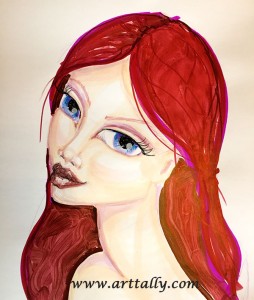 Drawing pretty faces is delightful. Especially watching perfect creamy complexions reveal themselves in the wake of the marker.
Drawing pretty faces is delightful. Especially watching perfect creamy complexions reveal themselves in the wake of the marker.
I can't help but ponder just how helpful a pretty face actually is. Some say pretty face, easy life. Perhaps so. Interesting how many judgments we make based on just a person's face. Most are positive, I'd say, but certainly not all of them.
On balance, if given a choice we would rather be pretty though, surely? It's like the old adage about money not buying happiness, but making unhappiness bearable. Being pretty opens a few doors, but has an obvious downside as Julie Burchill points out...
"It has been said that a pretty face is a passport. But it's not, it's a visa, and it runs out fast." Julie Burchill
Do you recognise any of these Shakespeare quotes about faces?
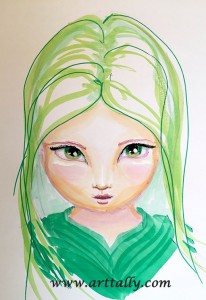 When in doubt... look to the Bard.... so let's see what William Shakespeare had to say about faces:
When in doubt... look to the Bard.... so let's see what William Shakespeare had to say about faces:
"One beautiful heart is better than thousand beautiful faces"
"There's no art to find the mind's construction in the face"
"My comfort is that old age, that ill layer-up of beauty, can do no more spoil upon my face."
"False face must hide what false heart doth know."
"How soon my sorrow hath destroyed my face."
"The tartness of his face sours ripe grapes."
Do you recognise any of these Shakespeare quotes about faces?
Beautiful eyes
"For beautiful eyes, look for the good in others; for beautiful lips, speak only words of kindness; and for poise, walk with the knowledge that you are never alone." - Audrey Hepburn
I love drawing beautiful eyes. In fact I think the eyes are the reason I draw faces in the first place.
Jane Davenport did a recent video for the documented life project - all about eyes. It is fascinating to watch her pull these eyes out of the page... check it out here.
Is a woman like a tea bag?
When I first read this quote - apparently from Eleanor Roosevelt... I loved it. Then I thought about it a bit more.... Is a woman like a tea bag? Hmmm ... do I really want to be compared to a tea bag? Not sure about that, thanks, Eleanor!
This quotation is often attributed to Eleanor Roosevelt but without citing which original writing it actually came from. Then others attribute a very similar quotation to Nancy Reagan:
"A woman is like a teabag — only in hot water do you realize how strong she is." - Nancy Reagan The Observer (29 March 1981)
Well yes, Ladies. We are definitely strong - I'll give you that. And I appreciate the sentiment although I would prefer to be compared to something more shapely and less disposable, to be honest.
Although, Eleanor Roosevelt often gets the credit for the remark it has apparently been around for many years. Or at least variants of the saying. The Quote Investigator believes that in the 19th century similar adages featuring eggs and potatoes and hot water were evident in Irish papers.
I guess it is something we have known for a long time, which applies to all of us - not just the women.
We don't necessarily realise how strong we are until we are tested.
Explore more of the tea time post series here
See the kitchen inspired artwork available in the shop
The comfort of tea is enough to inspire the poets
I have to say, drawing tea pots is fun. Especially if those tea pots have feet. This is actually one of my very own tea pots, a favourite for sure.
And to go alongside my cute teapot, I would like to share some rather cute poems. The first was written circa 1670. Tea has been comforting us for centuries - to the point that poets have been inspired to write about it. None of these poems has a title, but they are all rather apt, I feel. They acknowledge the benefit and comfort tea brings as well as its fairly illustrious history.
“Tea that helps our head and heart.
Tea medicates most every part.
Tea rejuvenates the very old.
Tea warms the hands of those who’re cold.”
“Steam rises from a cup of tea
and we are wrapped in history,
inhaling ancient times and lands,
comfort of ages in our hands.”
“The cozy fire is bright and gay,
The merry kettle boils away
and hums a cheerful song.
I sing the saucer and the cup;
Pray, Mary, fill the teapot up,
And do not make it strong”
Explore more of the Tea Time post series
The whale is poetry in motion
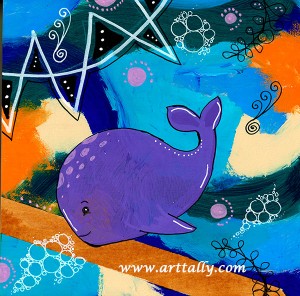 The whale is poetry in motion. Whales are the subject of my next set of animal panels. I rather enjoyed putting together this set. Don't get me wrong - I enjoy them all, but I think it was the colours in this set that made me feel particularly happy. And what is more delightful than a whimsical whale?
The whale is poetry in motion. Whales are the subject of my next set of animal panels. I rather enjoyed putting together this set. Don't get me wrong - I enjoy them all, but I think it was the colours in this set that made me feel particularly happy. And what is more delightful than a whimsical whale?
A whimsical whale poem or two, perhaps?
The Whale
The Whale is found in seas and oceans, Indulging there in fishlike motions, But Science shows that Whales are mammals, Like Jersey cows, and goats, and camels.
When undisturbed, the Whale will browse Like camels, goats, and Jersey cows, On food that satisfies its tongue, Thus making milk to feed its young.
Asking no costly hay and oats, Like camels, Jersey cows, and goats, The Whale, prolific milk producer, Should be our cheapest lactic juicer.
Our milk should all come from the sea, But who, I ask, would want to be— And here the proposition fails— The milkmaid to a herd of Whales?
by Ellis Parker Butler
Never ever keep a whale in your pond
Did you ever hear of the tale, about the Man...who kept in a small pond...a rather huge Whale.
(in my opinion, he should have gone to jail)
In this pond...the Whale would miserably sit, whilst the Man`s friends...all stared and pocked at it.
Then one night...the rains did heavily drop, and from the pond...the Whale did hop.
(not much of a hop, more of a twist and a belly flop)
And still the rains...did not cease to stop.
Flooding the land and lifting the house, up a tree...ran a door mouse.
Then the house started to move and float, being nudged by the Whale...it was now moving like a speed boat.
To the Ocean...they set sail, the house being pushed ever faster...by the huge Whale.
Now the man lives...all alone out at sea,
with the Whales now charging Dolphins...a small fish fee,
to see The Hairless Monkey...that belongs...back in a tree. by James Irwin
What will you try today? ...consider Picasso's advice...
"God is really only another artist. He invented the giraffe, the elephant and the cat. He has no real style, He just goes on trying other things." Pablo Picasso.
Excellent point, Picasso.
Let's let go of norm and expectation and try new, different things.
Play. Experiment.
This is good advice if you are an artist worrying about finding your style.
But really, it is good advice for all of us, in our daily lives. Life presents us with a veritable smorgasbord of opportunities. It would be a shame to miss out by not trying whatever we can. Sticking only to what we know deprives us of the chance to discover new joys.
What will you try today?
Play! Every day.... yes, even if you are an adult
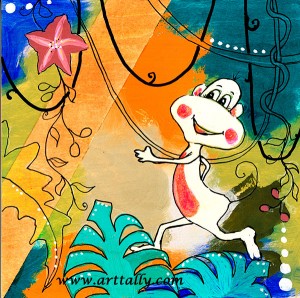 Play! Every day..... yes, even if you are an adult... in fact, especially if you are an adult. Children don't need to be told to play, but sadly, we adults do seem to need telling.
Play! Every day..... yes, even if you are an adult... in fact, especially if you are an adult. Children don't need to be told to play, but sadly, we adults do seem to need telling.
The Importance of Playing
One of the reasons I love to draw and paint is that for me it is play. And play is so important, for adults as well as children. Playfulness certainly influences my choice of subject matter. Just like these little guys. These monkeys remind me to play. They represent fun - something I choose to look for in each and every day.
There are so many reasons adults should be playing. Even playing video games can improve your quality of life and actually (contrary to what we may believe) it can make us more imaginative and improve our social skills. Playing reduces stress, increases our opportunities to bond with others who share our playful interests, and gives us something to look forward to.
Fave Quotations
I'd like to share some wise words (not mine!). These are some of my favourite quotations on the subject.
- "In every real man a child is hidden that wants to play." Frederic Nietsche
- "It is a happy talent to know how to play." Ralph Waldo Emmerson
- "A person's maturity consists in having found again the seriousness one had as a child, at play." Frederic Nietsche
- "Whoever wants to understand much must play much." Gottfried Benn.
- "Play is the highest form of research." Albert Einstein.
- "The creation of something new is not accomplished by the intellect but by the play instinct." Carl Jung.
- "You've achieved success in your field when you don't know whether what you are doing is work or play." Warren Beatty
- "You can discover more about a person in an hour of play than in a year of conversation." Plato
Creative courage
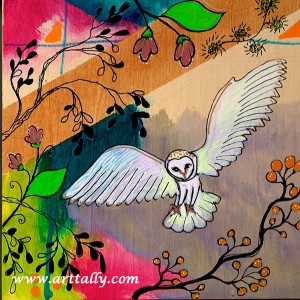 One of the things that I never really understood before was just how much courage creativity takes.
One of the things that I never really understood before was just how much courage creativity takes.
I have to admit that I spent an extraordinarily long time 'arranging my workspace' when I started this painting. I kept telling myself - its just paint and wood.... nothing to fear, surely?
And once you manage to get over that initial resistance its so much fun. I love colour. Splashing it about for the background just makes me happy. And I love my acrylic markers. I had some loud music going at first (I usually do... Only when that album was finished and I had silence did I notice the delightful scratch of the marker tip on the wood panel. Inexplicably soothing.
Indulging your creative side is a fascinating journey of self discovery. I don't think there are any solutions to finding creative bravery really, other than to feel the fear and do it anyway. That is what bravery is anyway, isnt it? It is not the absence of fear but the taking of action in spite of the fear.
"It takes a lot of courage to show your dreams to someone else." - Erma Bombeck
"Creativity requires the courage to let go of certainties." - Erich Fromm
"Creativity comes from trust. Trust your instincts." - Rita Mae Brown

